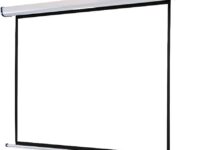Are Projectors Better For Your Eyes Than a Screen

In today’s world, screens have woven themselves into the fabric of our everyday existence. Questions over the effect such devices have on our eyes have increased along with the increase in screen time. Although most people use conventional screens, some have started using a projector for a better viewing experience.
But do projectors actually protect your eyes better than a screen does? We must all agree that a projector is more desirable when considering the effect on human eyes. A growing number of people are interested in using projectors as an alternative to conventional screens, even though most people are aware of the value of taking pauses and altering screen settings.
In this article, we will explore the advantages of using projectors and projector screens over traditional screens and how they can help alleviate some of the negative effects of prolonged screen time on our eyes. We’ll also go through the most recent findings in the field and offer helpful pointers for projector usage that’s both efficient and safe. After reading this article, you will know more about why projectors are a better option for your eyesight and viewing experience.
Pros:
Eye comfort:
Screens are more relaxing for the eyes than projectors. The majority of lighting devices that we use on a daily basis, including the TV displays in our living rooms and bulbs that flicker over our heads, are direct light emitters. This indicates that the light produced by these devices is reaching your eyes directly, which is bad for your eyes and will eventually cause eye damage. Compared to indirect light sources, direct light is more damaging to your eyes because of blue light exposure.
They exhibit larger images, which relieves the strain on the eyes from extended viewing. Glare and reflection concerns can be resolved by adjusting the projector settings to accommodate various lighting situations. Projectors’ diffused, gentler light output is less likely to strain or irritate the eyes.
Screen size:
When it comes to eye health, choosing a larger screen can prove advantageous, and projectors offer an edge over conventional screens in this aspect. Projectors offer a larger display size and changeable lighting settings that help lessen eye strain, making them a comfortable viewing option. The screen size of a projector can easily display images that are larger than what is feasible on a TV, such as ones that are over 100 inches or even 200 inches.
With larger screens, images and text appear more comfortably, alleviating eye fatigue and strain. Projectors provide the added benefit of easy screen size adjustment, making it effortless to read small text or perceive intricate details. This feature is particularly helpful in work environments where prolonged screen use can be taxing on the eyes.
Reduced risk of retinal injury:
Projectors are better for your eyes than screens because they produce images by the reflection of light, which is less harmful in comparison to the emitted light from other screens. Projectors don’t even produce any light. While LED monitors emit blue light, projection screens produce a red-green image that is not illuminated in the blue spectrum. Because of this, they are more pleasant for your eyes than desktop and television screens.
Projectors provide a flexible screen projection area and mitigate the harmful effects of blue light. The ability of projectors to display substantially bigger pictures reduces the strain on your eyes. Therefore, projectors are the better option if you want to avoid digital eye strain and protect your eyes from retinal injury.
Cons:
While projectors may provide a more comfortable viewing experience for your eyes due to their larger screen sizes, they do have some drawbacks. Projectors can struggle to project clear images in bright light, leading to blurred image projection.
Weak image:
Projectors have a weakness: they struggle to project clear images in a strong light. The projection may be hampered by external light sources, producing a fuzzy or washed-out image. In well-lit settings like boardrooms or outdoor gatherings, this is a concern. This can be particularly troublesome in well-lit settings like boardrooms or outdoor gatherings. While some projectors include brighter bulbs as a defense against this problem, they can be pricey and fail to work in bright settings. As a result, for the best image quality, projectors must be used in areas with low lighting.
Indoor viewing:
LCD TVs provide a better display for indoor viewing during the day than projectors. LCD TVs display precise images even in natural light, ensuring comfortable viewing. In contrast, projectors may show blurred images in brightly lit conditions, causing eye strain and discomfort. While projectors offer larger screens, they may not be the best option for well-lit environments. LCD TVs, designed for high-quality images in any lighting condition, are ideal for daytime viewing.
How Does Blue Light Damage Your Eyes?
Blue light comes from natural sunlight and artificial sources like lightbulbs, computer screens, and TVs. Most of it is harmless, but the high-energy blue-violet light in the 415-455nm range can be tough on the eyes, especially the lens and retina. This type of blue light falls into the UV intensity category, which we know can be harmful if you’re exposed to too much (like getting sunburned). Unfortunately, wearing sunglasses that block UV light isn’t a great solution when you’re trying to enjoy your favorite movie or show.
Conclusion
In conclusion, projectors are healthier for your eyes than other light-emitting objects, such as LCDs or TV screens. Projectors are useful in lowering the risk of digital eye strain and eye strain due to their greater projection area and absence of blue light emission. Projectors are also a cozy choice for prolonged viewing periods because they don’t produce direct light. Projectors are the best option if you want to keep your eyes safe and have a comfortable viewing experience.
Related Posts:


